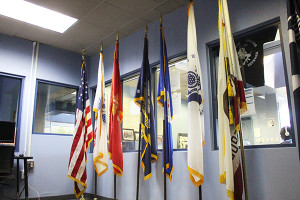Nearly a decade ago Professor Bruce Solheim, Ph.D., and a few student veterans got behind the idea of providing a haven for students who had served in the military. The result was the Citrus College Veterans Program.
Citrus College was the first college in the nation to offer a transitional course for veterans.
For Martha McDonald, Ed.D, interim executive dean at Citrus College, this fact sets the veterans center apart from other Community Colleges centers.
“Some of the colleges call them resource centers,” said McDonald. “We call ours the Veterans Success Center because it’s more than just a resource.”
According to the VSC website, Citrus College has over 500 veteran students who utilize the VSC to study, connect, and readjust to a different lifestyle.
Monica Christianson, the VSC Director, can see the students struggle when they return from deployment and no longer have the structure they’re used to on a daily basis
To help student veterans’ transition from structured military life to student life, Christianson tries to ‘hand off’ one veteran to the next in an effort to ensure that those returning form deployment feel comfortable.
“The VSC helped me slowly transition back into this type of lifestyle where you’re back at home with family and friends,”
-Baron Cheng, Veterans Success Center volunteer
Baron Cheng, 26, who served four years in the Marine Corps, began volunteering at the VSC once he returned from deployment.
At the VSC, Cheng is in the company of peers that understand the military lifestyle he and other veterans are accustomed to.
“The VSC helped me slowly transition back into this type of lifestyle where you’re back at home with family and friends,” Cheng said.
Cheng and other veteran often study in the VSC because it is less crowded than the library and they can depend on each other for help and companionship.
Christianson witnesses the benefits of the VSC every day. “The most utilized resource here at the VSC is the building itself,” she said.
While the VSC continues to provide assistance for student veterans, it is currently struggling with funding.
VSC ran out of grant funding in 2013 and it has been relying on other sources to provide resources to veterans ever since. “I feel like we’re keeping the VSC open with Band-Aids,” McDonald said. “Right now we have funding through the [Citrus College Foundation], from the Associated Students, from a private donor and some from the district.”
California Assembly member Roger Hernandez who represents D-48 recently introduced bill AB 393 to assist veteran resource centers in California’s Community College system, as announced Feb. 19 in a press release.
The bill would establish a Veterans Resource Centers Grant Program that will allow California community colleges to apply for funding to start a Veterans Resource Center or increase funding for their already established centers.
McDonald, Christianson and the Citrus College Foundation director,Christina Garcia, had an opportunity to meet with Assemblyman Roger Hernandez and informed him about the Veterans Success Center on campus. “Through that meeting [McDonald] was able to share some of the challenges that we face in the community colleges as far as funding for Veteran Success Centers.”
A report released by the California Community Colleges Chancellor Office in 2014 found that Veteran Resource Centers are integral in assessing and responding to the unique needs of veteran students.

“Veteran students should have one place on each campus to receive assistance,” said Hernandez
The Veteran Resource Centers Grant Program would be administered by the Chancellor of the California Community Colleges and will allow districts to apply for grants that provide resources to students who are veteran and active duty members of the U.S. Armed Forces.
The Chancellor of California Community Colleges would be responsible for selecting colleges to receive funding awards.
The VSC at Citrus was hoping for categorical funding but remains hopeful with the introduction of bill AB 393.
Despite the urgency of funding the VSC holds events and fundraisers like their All-You-Can-Eat Applebee’s Fundraising Breakfast on Saturday morning where 50 percent of proceeds will go to the Veterans Student Network Club.
“I think we have a very successful program and the biggest challenge is the funding,” said McDonald. “To be able to provide the resources, the support, and the program that we have in place for next academic year we need that funding.”
Continuous funding would be beneficial but until then programs like the VSC rely on opportunities like the Veterans Resource Center Grant program.
“We’re excited because it’s a start in the right direction,” Christianson said. “There’s going to be some money available for community colleges to tap into to help and that’s what we wanted.”


